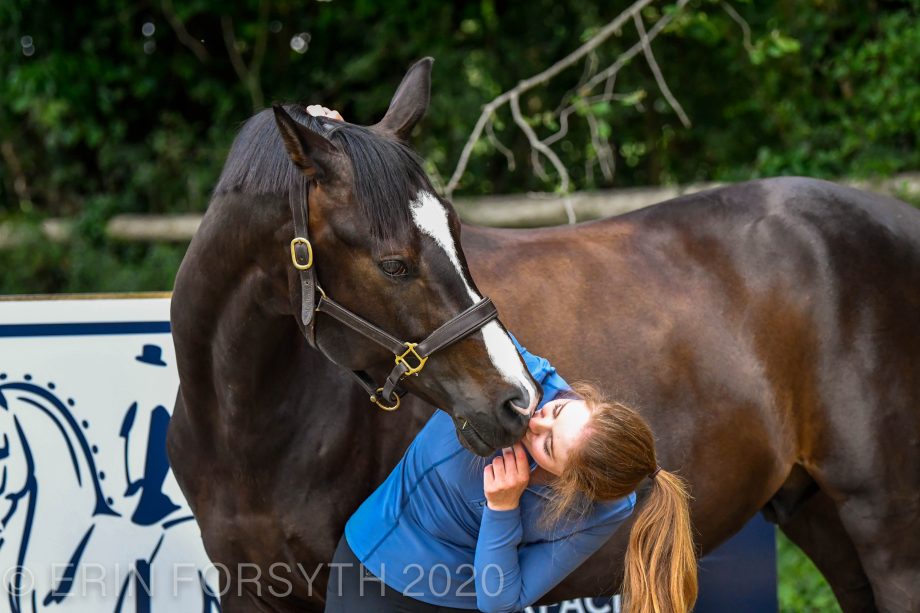H&H’s dressage columnist shares his philosophies surrounding training and starting his young horses
Having no shows over the past few months has taken some pressure off and allowed me to discover a new philosophy in training. Putting competition dates in the diary creates a deadline, and with it an element of subconscious stress, and many of us find that we want to practise all the time.
But I have found that when it comes to teaching new things, horses don’t always have to actually achieve the task in hand to make progress – they can benefit by simply giving something a go.
{"content":"PHA+UHJldmlvdXNseSwgSSB3b3VsZCBiZSByZWx1Y3RhbnQgdG8gZW5kIGEgdHJhaW5pbmcgc2Vzc2lvbiB1bnRpbCBhIGhvcnNlIGhhcyBhdCBsZWFzdCB1bmRlcnN0b29kIGEgY2VydGFpbiBjb25jZXB0LCBmb3IgZXhhbXBsZSwgZmx5aW5nIGNoYW5nZXMsIGFuZCBtYWRlIHNvbWUgY29uY3JldGUgcHJvZ3Jlc3MuPC9wPgo8cD5Nb3JlIHJlY2VudGx5LCBJIGhhdmUgcmVhbGlzZWQgdGhhdCBpZiBJIHRyeSBhIGZseWluZyBjaGFuZ2UgaW4gdHJhaW5pbmcgYW5kIG5vdGhpbmcgaGFwcGVucywgZXZlbiBpZiBJIGxlYXZlIGl0IGFuZCBkbyBzb21ldGhpbmcgZWxzZSBmb3IgdGhlIHJlbWFpbmRlciBvZiB0aGUgc2Vzc2lvbiwgdGhlIG5leHQgdGltZSBJIGNvbWUgYmFjayB0byBjaGFuZ2VzIHdpdGggdGhhdCBob3JzZSwgdGhleSBoYXZlIGEgZ3JlYXRlciB1bmRlcnN0YW5kaW5nIG9mIHdoYXQgSSBhbSBhc2tpbmcuPC9wPgo8cD5JdCB3YXMgYWN0dWFsbHkgd29ya2luZyBvdXQgbXlzZWxmIGluIHRoZSBneW0gdGhhdCBoZWxwZWQgbWUgdW5kZXJzdGFuZCB0aGlzIHByaW5jaXBsZS4gTXkgd2lmZSBNYXlhIGRvZXMgQ3Jvc3NGaXQsIGFuZCB3YXMgZG9pbmcgYSBzZXQgb2Yg4oCca2lwcGluZ+KAnSBwdWxsLXVwcywgd2hlcmUgeW91IHVzZSB5b3VyIG93biBtb21lbnR1bSB0byBjcmVhdGUgc3BlZWQgaW4gdGhlIG1vdmVtZW50LjwvcD4KPHA+PGRpdiBjbGFzcz0iYWQtY29udGFpbmVyIGFkLWNvbnRhaW5lci0tbW9iaWxlIj48ZGl2IGlkPSJwb3N0LWlubGluZS0yIiBjbGFzcz0iaXBjLWFkdmVydCI+PC9kaXY+PC9kaXY+PHNlY3Rpb24gaWQ9ImVtYmVkX2NvZGUtMzEiIGNsYXNzPSJoaWRkZW4tbWQgaGlkZGVuLWxnIHMtY29udGFpbmVyIHN0aWNreS1hbmNob3IgaGlkZS13aWRnZXQtdGl0bGUgd2lkZ2V0X2VtYmVkX2NvZGUgcHJlbWl1bV9pbmxpbmVfMiI+PHNlY3Rpb24gY2xhc3M9InMtY29udGFpbmVyIGxpc3RpbmctLXNpbmdsZSBsaXN0aW5nLS1zaW5nbGUtc2hhcmV0aHJvdWdoIGltYWdlLWFzcGVjdC1sYW5kc2NhcGUgZGVmYXVsdCBzaGFyZXRocm91Z2gtYWQgc2hhcmV0aHJvdWdoLWFkLWhpZGRlbiI+DQogIDxkaXYgY2xhc3M9InMtY29udGFpbmVyX19pbm5lciI+DQogICAgPHVsPg0KICAgICAgPGxpIGlkPSJuYXRpdmUtY29udGVudC1tb2JpbGUiIGNsYXNzPSJsaXN0aW5nLWl0ZW0iPg0KICAgICAgPC9saT4NCiAgICA8L3VsPg0KICA8L2Rpdj4NCjwvc2VjdGlvbj48L3NlY3Rpb24+PC9wPgo8cD5JIHRob3VnaHQgaXQgbG9va2VkIHF1aXRlIGVhc3ksIGFuZCBnYXZlIGl0IGEgZ28sIGJ1dCBlbmRlZCB1cCBqdXN0IHN3aW5naW5nIGFyb3VuZCBhIGxvdCBvbiB0aGUgYmFyLCBwcm9iYWJseSBsb29raW5nIGxpa2UgSSB3YXMgaGF2aW5nIHNvbWUgc29ydCBvZiBzcGFzbS4gSSB3YXMgZGV0ZXJtaW5lZCB0byBjcmFjayBpdCwgYW5kIHNwZW50IGEgbG9uZyB0aW1lIHRoYXQgbmlnaHQgdHJ5aW5nLCBldmVudHVhbGx5IG1ha2luZyBteXNlbGYgcXVpdGUgc29yZSBidXQgbm90IGFjaGlldmluZyBtdWNoLjwvcD4KPHA+QnV0IHdoZW4gSSBjYW1lIGJhY2sgdG8gaXQgYSBjb3VwbGUgb2YgZGF5cyBsYXRlciwgc3RyYWlnaHQgYXdheSBJIGhhZCBhIGJldHRlciBjb25jZXB0IG9mIHdoYXQgSSBuZWVkZWQgdG8gZG87IEkgaW1wcm92ZWQgcmlnaHQgZnJvbSB0aGUgYmVnaW5uaW5nIG9mIHRoZSBzZWNvbmQgc2Vzc2lvbiwgYmVjYXVzZSBteSBib2R5IGFuZCBtaW5kIGhhZCBoYWQgdGltZSB0byBwcm9jZXNzIHdoYXQgSSBoYWQgc3BlbnQgc28gbG9uZyB0cnlpbmcgdG8gbGVhcm4gdGhlIGZpcnN0IHRpbWUuPC9wPgo8cD5JdOKAmXMgdGhlIHNhbWUgd2l0aCBob3JzZXMg4oCTIHRoZXkgbmVlZCB0aW1lIHRvIHByb2Nlc3MgdGhlIGNvbmNlcHQgb2Ygc29tZXRoaW5nIG5ldyBvciBjaGFsbGVuZ2luZywgYW5kIHB1c2hpbmcgdG9vIG11Y2ggaW4gdGhlIGZpcnN0IHNlc3Npb24gc2ltcGx5IGNyZWF0ZXMgdGVuc2lvbiwgd2hpY2ggYWN0dWFsbHkgYmxvY2tzIHRoZW0gZnJvbSBiZWluZyBhYmxlIHRvIGFjaGlldmUgaXQuPC9wPgo8ZGl2IGNsYXNzPSJhZC1jb250YWluZXIgYWQtY29udGFpbmVyLS1tb2JpbGUiPjxkaXYgaWQ9InBvc3QtaW5saW5lLTMiIGNsYXNzPSJpcGMtYWR2ZXJ0Ij48L2Rpdj48L2Rpdj4KPHA+SG93IG1hbnkgdGltZXMgaGF2ZSB3ZSBnaXZlbiBhIGhvcnNlIHRpbWUgb2ZmIGZvciB3aGF0ZXZlciByZWFzb24sIGFuZCB3aGVuIHdlIGdldCBiYWNrIG9uLCBmb3VuZCB0aGV5IGFyZSBzdWRkZW5seSBtdWNoIGJldHRlciBhdCBzb21ldGhpbmcgd2l0aCB3aGljaCB0aGV5IHdlcmUgcHJldmlvdXNseSBzdHJ1Z2dsaW5nPzwvcD4KPHA+SXTigJlzIHNvIGltcG9ydGFudCBub3QgdG8gYmUgdG9vIGRlYWRsaW5lLWZvY3VzZWQgd2hlbiB0cmFpbmluZywgYnV0IHRvIGdpdmUgdGhlIGhvcnNlIHRpbWUgdG8gcHJvY2VzcyB3aGF0IGl0IGlzIHRoYXQgeW91IGFyZSBhc2tpbmcgb2YgdGhlbS48L3A+CjxkaXYgY2xhc3M9ImFkLWNvbnRhaW5lciBhZC1jb250YWluZXItLW1vYmlsZSI+PGRpdiBpZD0icG9zdC1pbmxpbmUtNCIgY2xhc3M9ImlwYy1hZHZlcnQiPjwvZGl2PjwvZGl2Pgo8aDM+UGF0aWVuY2UgcGF5czwvaDM+CjxwPldlIGhhdmUgYWxzbyBlc3RhYmxpc2hlZCBhIHNsaWdodGx5IGRpZmZlcmVudCBzeXN0ZW0gZm9yIGJhY2tpbmcgb3VyIHlvdW5nc3RlcnMuIFdlIHNwZW5kIG1vcmUgdGltZSB3b3JraW5nIHdpdGggdGhlbSBvbiB0aGUgZ3JvdW5kLCBhbmQgYmFja2luZyB0aGVtIGluIHRoZSBzdGFibGUsIHdoZXJlIHRoZXkgYXJlIG1vcmUgcmVsYXhlZCBjb21wYXJlZCB3aXRoIGJlaW5nIHRha2VuIHRvIHRoZSBpbmRvb3Igc2Nob29sIGF3YXkgZnJvbSBhbGwgdGhlaXIgZnJpZW5kcy48L3A+CjxwPldlIGFsc28gc3RhcnQgb2ZmIHdpdGhvdXQgYSBzYWRkbGUg4oCTIHZlcnkgb2Z0ZW4gd2hlbiBiZWluZyBiYWNrZWQsIHRoZSBob3JzZSBlbmRzIHVwIHJlYWN0aW5nIHRvIGJvdGggdGhlIHJpZGVyIGFuZCB0aGUgdGFjaywgYW5kIGRldmVsb3BpbmcgcHJvYmxlbXMgd2l0aCB0aGUgc2FkZGxlLiBCeSBnZXR0aW5nIHRoZW0gdXNlZCB0byB0aGUgdHdvIHNlcGFyYXRlbHkgd2UgYXJlIGVuY291bnRlcmluZyBmZXdlciBpc3N1ZXMgd2l0aCBob3JzZXMgYmVpbmcgY29sZC1iYWNrZWQuPC9wPgo8ZGl2IGNsYXNzPSJhZC1jb250YWluZXIgYWQtY29udGFpbmVyLS1tb2JpbGUiPjxkaXYgaWQ9InBvc3QtaW5saW5lLTUiIGNsYXNzPSJpcGMtYWR2ZXJ0Ij48L2Rpdj48L2Rpdj4KPHA+VGhpcyBtZXRob2QgYWxzbyBtZWFucyBsZXNzIGx1bmdlaW5nIGR1cmluZyB0aGUgZWFybHkgc3RhZ2VzIOKAkyBsdW5nZWluZyBoYXMgaXRzIHBsYWNlIGluIHRyYWluaW5nIGJ1dCBpdCBpcyBub3QgYWx3YXlzIGdyZWF0IGZvciB0aGUgdmVyeSB5b3VuZyBob3JzZXMgdG8gc3BlbmQgbG90cyBvZiB0aW1lIG9uIGEgY2lyY2xlLjwvcD4KPHA+SSBhbSBjZXJ0YWlubHkgZmluZGluZyB0aGF0IGJlaW5nIHBhdGllbnQgaW4gdGhlIGZpcnN0IGluc3RhbmNlIGNyZWF0ZXMgYSByb3V0ZSB0byBtb3JlIHN1Y2Nlc3MgZG93biB0aGUgbGluZS48L3A+CjxoMz5VcCBhbmQgY29taW5nPC9oMz4KPHA+V2hlbiBpdCBjb21lcyB0byB0aGUgb2xkZXIgaG9yc2VzLCBJIGhhdmUgdGhyZWUgY29taW5nIHRocm91Z2ggdGhlIHJhbmtzIHRoYXQgSeKAmW0gcmVhbGx5IGV4Y2l0ZWQgYWJvdXQsIGluY2x1ZGluZyBEYW50ZSBWWCwgYSBzZXZlbi15ZWFyIG9sZCBieSBEYW50ZSBXZWx0aW5vIHdobyBoYXMgYSBsb3Qgb2YgdGFsZW50IGZvciB0aGUgZ3JhbmQgcHJpeCB3b3JrLiBXZeKAmXJlIHdvcmtpbmcgb24gY3JhY2tpbmcgaGlzIHBhc3NhZ2UgYXQgdGhlIG1vbWVudCwgYnV0IHdoZW4gaGUgZ2V0cyB0aGF0IGhlIHdpbGwgZ28gaW50byBhIHdob2xlIG90aGVyIGdlYXI7IGhlIGhhcyBhIHN1cGVyIG5hdHVyYWwgbWVjaGFuaWMgaW4gYWxsIHRocmVlIHBhY2VzLCBhbmQgYW1hemluZyB0YWxlbnQgZm9yIHBpYWZmZS48L3A+CjxwPlRoZW4gdGhlcmXigJlzIERpc3RpbmN0aW9uIE1TSiwgYSBEaW1hZ2dpbyBzZXZlbi15ZWFyLW9sZCB3aG\/igJlzIGFwcHJvYWNoaW5nIHByaXggc3QgZ2VvcmdlcyBsZXZlbCwgYW5kIGEgRmlkZXJ0YW56IGVpZ2h0LXllYXItb2xkIGNhbGxlZCBGaWdsaW8uIEhlIHVzZWQgdG8gYmUgcXVpdGUgbmF1Z2h0eSBhbmQgd2FzIGEgYml0IG9mIGEgcHJvamVjdCwgYnV0IGlzIGNvbWluZyBhbG9uZyByZWFsbHkgd2VsbCBub3cuPC9wPgo8ZGl2IGNsYXNzPSJpbmplY3Rpb24iPjwvZGl2Pgo8cD5JIGFsc28gaGF2ZSAxMC15ZWFyLW9sZCBEYWx0cmV5LCB3aG8gaXMgcmVhZHkgdG8gZ28gZ3JhbmQgcHJpeC4gSGUgaXMgYSBsb3ZlbHkgZ3V5IOKAkyBtYXliZSBub3QgYSBob3JzZSB3aG8gd2lsbCBnbyBvbiB0byB3aW4gbWVkYWxzLCBidXQgYSBzdXBlciBjaGFyYWN0ZXIuIEkgY2Fu4oCZdCB3YWl0IGZvciB0aG9zZSBvdGhlcnMgdG8gY29tZSB1cCB0aGUgbGV2ZWxzIOKAkyB0aGV5IGhhdmUgdGhlIGNhbGlicmUgdG8gZ2V0IHRvIHRoZSB2ZXJ5IHRvcC48L3A+CjxwPjxlbT5SZWYgSG9yc2UgJmFtcDsgSG91bmQ7IDkgSnVseSAyMDIwPC9lbT48L3A+CjxwPgo="}
You may also be interested in…
In a one-to-one interview with the newly appointed European dressage squad member, Horse & Hound's dressage editor finds out a
Credit: Jon Stroud Media
The international dressage rider talks pre-test rituals, diesel engines, and what she’s learned that’s helped her climb back to the
Credit: Erin Forsyth
Joanna raises some interesting points about training dressage horses
Credit: Trevor Meeks
The four-time Olympian reveals his pre-flight checks, why he uses science in schooling and why he believes it’s important to
Credit: Storm Johnson
Credit: Peter Nixon
The Olympic dressage rider on understanding his horses, pre-test resets and the grand prix ride he’d like to have back
Stay in touch with all the news in the run-up to and throughout the major shows and events during 2026 and beyond with a Horse & Hound subscription. Subscribe today for all you need to know ahead of these major events, plus online reports on the action as it happens from our expert team of reporters and in-depth analysis in our special commemorative magazines. Have a subscription already? Set up your unlimited website access now






